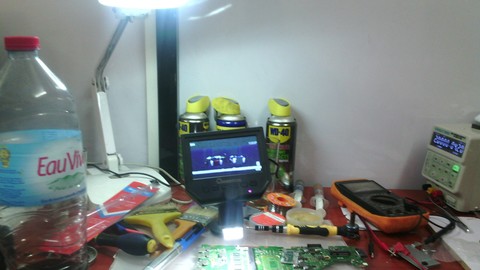
Master your laptop hardware
Master your laptop hardware, available at $19.99, has an average rating of 3.25, with 41 lectures, 19 quizzes, based on 134 reviews, and has 18655 subscribers.
You will learn about The basic principles of electronics applied to laptop board Reading electronic schematic Using boardview to find electrical components easily The process taking place inside your motherboard before working Using digital multimeter The electronic troubleshooting principles The most common faults in laptop board This course is ideal for individuals who are We created this course for everybody. It is particularly useful for We created this course for everybody.
Enroll now: Master your laptop hardware
Summary
Title: Master your laptop hardware
Price: $19.99
Average Rating: 3.25
Number of Lectures: 41
Number of Quizzes: 19
Number of Published Lectures: 40
Number of Published Quizzes: 19
Number of Curriculum Items: 60
Number of Published Curriculum Objects: 59
Original Price: $19.99
Quality Status: approved
Status: Live
What You Will Learn
- The basic principles of electronics applied to laptop board
- Reading electronic schematic
- Using boardview to find electrical components easily
- The process taking place inside your motherboard before working
- Using digital multimeter
- The electronic troubleshooting principles
- The most common faults in laptop board
Who Should Attend
- We created this course for everybody.
Target Audiences
- We created this course for everybody.
Our Ultimate guide (ebook) to laptop repair is OUT on 30 October 2020
You can pre order it here https://www..payfacile…com/tanamtech/s/guide-to-laptop-repair
This course aims to equip you with the basis so that you can understand your computer at electrical level.
In the first section, we will see the block diagram of laptop.
Then, we’ll dive right into the basics of electronics.
We will also teach you how to use multimeter and other tools so that you can confidently test any electronic boards.
We won’t forget to introduce to you the electronic schematic and boardview.
We won’t end there. We will also see some advanced circuits and learn how they work.
Course Curriculum
Chapter 1: Introduction
Lecture 1: Introduction
Lecture 2: How computer works
Lecture 3: How motherboard works
Lecture 4: Identifying the main motherboard parts
Chapter 2: Electronic basics
Lecture 1: What is circuit?
Lecture 2: Different types of circuit
Lecture 3: Voltage and Current
Lecture 4: Diode
Lecture 5: Resistance and resistor
Lecture 6: The Ohm's Law
Lecture 7: Capacitor
Lecture 8: Identifying resistor and capacitor on board
Lecture 9: Voltage divider
Lecture 10: Inductor
Lecture 11: Identifying inductor
Lecture 12: Transistor
Lecture 13: Mosfet
Lecture 14: Boost current with mosfet
Lecture 15: Identifying Mosfet
Chapter 3: Buck converter and the 19V circuit
Lecture 1: The 19v circuit
Lecture 2: The 19v in-depth
Lecture 3: The buck converter
Chapter 4: How the processor works?
Lecture 1: Abstraction layer
Chapter 5: Reading schematic and using boardview
Lecture 1: Reading schematic
Lecture 2: Downloading Boardviewer (Windows only)
Lecture 3: Downloading OpenBoardView
Lecture 4: Boardview Example: Part 1
Lecture 5: Boardview Example: Part 2
Chapter 6: Diagnosis of electronic board
Lecture 1: Electronic Troubleshooting principles
Lecture 2: Using multimeter to test voltage
Lecture 3: Using multimeter to test resistance
Lecture 4: Find a short-circuit with multimeter: test impedance
Lecture 5: Using the DC power Supply
Chapter 7: Main power circuit in motherboard
Lecture 1: The main voltage regulator
Lecture 2: The RAM power circuit
Lecture 3: The graphic power circuit
Lecture 4: The PCH power circuit
Lecture 5: The CPU power circuit
Chapter 8: KeyBoard: How it works
Lecture 1: The keyboard and its controller
Lecture 2: Identifying the connector and keyboard controller
Instructors
-
Aina Lucien Razafindraibe
Aina Luc
Rating Distribution
- 1 stars: 31 votes
- 2 stars: 15 votes
- 3 stars: 32 votes
- 4 stars: 23 votes
- 5 stars: 33 votes
Frequently Asked Questions
How long do I have access to the course materials?
You can view and review the lecture materials indefinitely, like an on-demand channel.
Can I take my courses with me wherever I go?
Definitely! If you have an internet connection, courses on Udemy are available on any device at any time. If you don’t have an internet connection, some instructors also let their students download course lectures. That’s up to the instructor though, so make sure you get on their good side!
You may also like
- Top 10 Video Editing Courses to Learn in November 2024
- Top 10 Music Production Courses to Learn in November 2024
- Top 10 Animation Courses to Learn in November 2024
- Top 10 Digital Illustration Courses to Learn in November 2024
- Top 10 Renewable Energy Courses to Learn in November 2024
- Top 10 Sustainable Living Courses to Learn in November 2024
- Top 10 Ethical AI Courses to Learn in November 2024
- Top 10 Cybersecurity Fundamentals Courses to Learn in November 2024
- Top 10 Smart Home Technology Courses to Learn in November 2024
- Top 10 Holistic Health Courses to Learn in November 2024
- Top 10 Nutrition And Diet Planning Courses to Learn in November 2024
- Top 10 Yoga Instruction Courses to Learn in November 2024
- Top 10 Stress Management Courses to Learn in November 2024
- Top 10 Mindfulness Meditation Courses to Learn in November 2024
- Top 10 Life Coaching Courses to Learn in November 2024
- Top 10 Career Development Courses to Learn in November 2024
- Top 10 Relationship Building Courses to Learn in November 2024
- Top 10 Parenting Skills Courses to Learn in November 2024
- Top 10 Home Improvement Courses to Learn in November 2024
- Top 10 Gardening Courses to Learn in November 2024





















